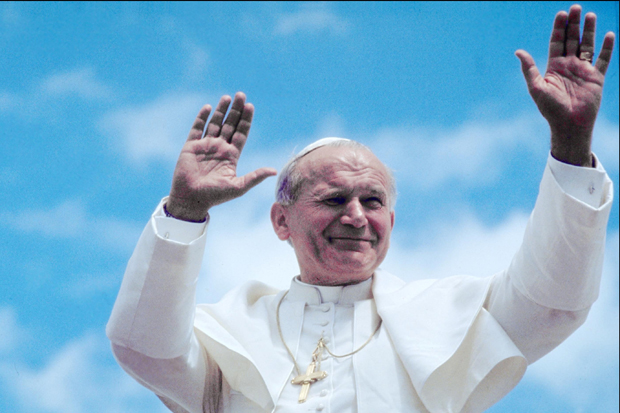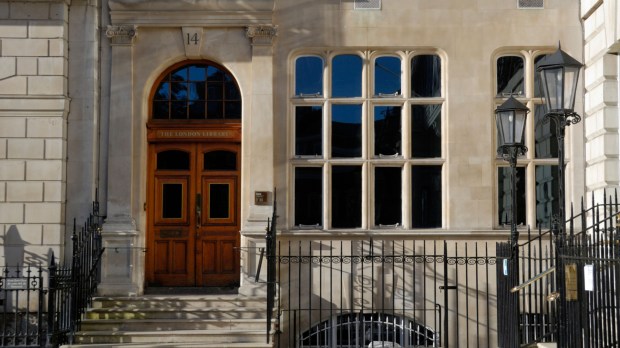In his authoritative biography of Pope John Paul II, George Weigel writes lucidly about the unlucid subject of phenomenology. It is a way of thinking which rejects the dry categories of empiricists and the abstractions of idealists, and concentrates instead on ‘the basic experiences of life as they come to us’. Weigel takes the example of ‘girl meets boy’: ‘An empiricist will analyse the brain chemistry of a young woman seeing, hearing and touching a handsome young man … an idealist may worry that the young woman’s commitment to the second categorical imperative [of Kant] (never use another person as a means) may be wavering in the face of other desires. The phenomenologist … will be interested in the experience as a whole, the psychological, physical, moral and conceptual elements moving this young woman.’ What about when married woman meets handsome young cardinal? Then it gets even more interesting.
Edward Stourton’s revelations on Panorama on Monday suggest that the encounter between Karol Wojtyla and Anna-Teresa Tymieniecka, a fellow phenomenologist, subjected this philosophy to a severe real-life test. After a couple of years’ acquaintance in the 1970s, she declared to him, in writing, that she loved him. He refused any illicit relationship, but told her she was ‘the gift of a person’ which, though he was ‘afraid’ of it, was ‘a gift from heaven’. When writing his main philosophical work Person and Act, Wojtyla told a fellow priest that it was ‘devoted to the metaphysical sense and mystery of the PERSON’. Now he confronted that mystery, and its temptations, in the form of a beautiful woman whose thought was close to his, and who was offering him her heart. And then he became Pope! John Paul’s philosophical inquiry in Person and Act was directed towards replacing Descartes’ famous, ‘I think therefore I am’ with ‘I understand therefore I am.’ Now he really had to understand and to be. It is impossible not to be struck by how dangerous this encounter, which was to prove lifelong, must have been, but also not to be moved by it. Seldom can a Pope, when trying to comprehend human love, have known so directly — and suffered for — what he was talking about.
But perhaps causing suffering too. Anna-Teresa’s only appearance in Weigel’s book is in a long footnote about Person and Act. She helped Wojtyla with the book, and translated it into English, giving it the title — to which Weigel objects — of The Acting Person. This appeared when Wojtyla was Pope (I remember getting hold of it then and understanding barely a word), and Anna-Teresa was accused by some of twisting the Pope’s thought towards her own, pushing ahead with publication ‘to the intense aggravation’ (Weigel’s phrase) of the Pope’s philosophical colleagues. The Vatican was trying to freeze her out, and John Paul, while not himself repudiating her, let this happen. It may also be true, on the other hand, that Anna-Teresa was overstating her claims on the man and his ideas, even to the point of frightening him. The fact that she later decided to sell her 350 letters from John Paul to the National Library of Poland for $3.5 million suggests that she did not always put her devotion to him first. But these faults on both sides are a natural thing when two people love one another but are filled with doubts and dreads caused by their extraordinary situation. After his death, she must rightly have feared for her reputation, and sought the means to defend it.
There is something else about this story. It is almost a love triangle. John Paul was also close to Dr Wanda Poltawska, a survivor of Ravensbruck concentration camp, who is still alive. John Paul wrote her many letters — more priestly, less personal — which have already been published. In Weigel’s pregnant footnote about Anna-Teresa, he mentions that Wanda’s husband was one of those trusted by John Paul to ‘review and correct’ Anna-Teresa’s translation but ‘she refused to take corrections from anyone other than Wojtyla’. Anna-Teresa was with John Paul on the day before he died, Wanda on the day of his death. Was one truer to him than the other? Did he favour either, or did he succeed, in the end, in displaying the indifferent love of the saint?
A minister has ‘saved’ the tradition by which parliamentary Acts are recorded on vellum. It surprised me that this was done by the Cabinet Office, since it is a matter for the House of Lords. It surprised me even more that the Cabinet Office was offering to provide the £80,000 p.a. which would have been saved by switching to paper. Rarely in Whitehall does one department try to shoulder someone else’s financial burden. What is going on? The minister whose intervention was announced on Monday is the able Matt Hancock. Mr Hancock is extremely close to George Osborne. Mr Osborne is the main tactician for the ‘remain’ camp in the EU referendum. Would it be too Machiavellian to guess that Mr Osborne is keen not to permit any small act which could be seen as disrespectful to the traditions of Parliament at this time? Might this explain why the normally go-ahead Mr Hancock is talking excitedly about the ‘millennium-long tradition’ of vellum? In the referendum, Britain has the chance to revert to our almost millennium-long tradition of parliamentary independence, but Mr Osborne does not want us to do that, so Mr Hancock’s £80,000 is a very small sop. Having talked to the Lords authorities, I find it is not certain that the Cabinet Office will end up paying. I have also established that one vastly significant part of our legislation is not preserved on vellum: EU Regulations are kept on paper only. Vellum symbolises what we once had, but are losing.
Even better than vellum for the ‘remain’ cause is a prince. Sir David Manning, ex-Foreign Office, is a trusted mentor of Prince William’s. Did he have a hand in the Duke’s speech there on Tuesday? Did anyone advise HRH how his words would be interpreted?
Got something to add? Join the discussion and comment below.
Get 10 issues for just $10
Subscribe to The Spectator Australia today for the next 10 magazine issues, plus full online access, for just $10.
You might disagree with half of it, but you’ll enjoy reading all of it. Try your first month for free, then just $2 a week for the remainder of your first year.















Comments
Don't miss out
Join the conversation with other Spectator Australia readers. Subscribe to leave a comment.
SUBSCRIBEAlready a subscriber? Log in